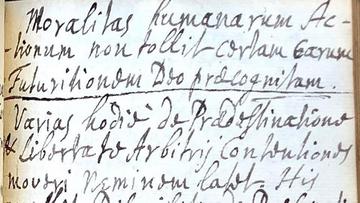The exciting discovery of a notebook by Isaac Newton’s roommate, which contains new and important information about Newton’s activities at an otherwise rather mysterious point in his life, has been written up by Dmitri Levitin (Oxford) and Scott Mandelbrote (Cambridge).
How do people change their minds? More specifically, how did people in pre-modern societies, in which various “orthodoxies” – above all religious – were strictly enforced, come to deviate from those orthodoxies?
Today, the most tempting answer is also the most romantic: by sheer force of intellect, the greatest thinkers freed themselves from the bondage of intellectual constraints. Nowhere is such an interpretation more alluring than in the case of Isaac Newton. It has long been known that as well as being the greatest mathematician of his age, and the discoverer of universal gravitation, Newton was also a highly unusual Christian. At some point in his adult years, and certainly by 1690, Newton had dismantled the standard biblical proofs for the doctrine of the Trinity. He kept his doubts largely secret, and with good reason – the Blasphemy Act of 1698 (parts of which remained in force until 2008) was primarily intended to prevent public attack on the doctrine. In 1710, William Whiston, Newton’s successor as Lucasian Professor of Mathematics at Cambridge, lost his post for advancing a similar heterodoxy to that of his mentor. Rumours swirled, but Newton’s views only became public during the decades after his death. They have been a cause of relentless study and speculation ever since.




